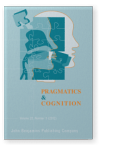Vol. 20:3 (2012) ► pp.483–504
The principle of relevance in the light of cooperation and trust
Discussing Sperber and Wilson’s theory
The principle of relevance of Sperber and Wilson (1995) underestimates the role of cooperation, and the theory’s inclination toward an individual intentionality is problematic. These are two of the critical observations that this paper introduces and discusses. Through a constant counterpoint with the aforementioned authors, the core arguments of their theory are analyzed in each section of this paper. The discussion will allow us to observe why it is necessary to include the notions of cooperation and collective intention in the explanation of the relevance theory and, at the same time, the concept of trust. Finally, it is also important to stress the distinction between the informative and argumentative conversational modes to achieve a full understanding of relevance.
Cited by
Cited by 5 other publications
This list is based on CrossRef data as of 12 april 2024. Please note that it may not be complete. Sources presented here have been supplied by the respective publishers. Any errors therein should be reported to them.
